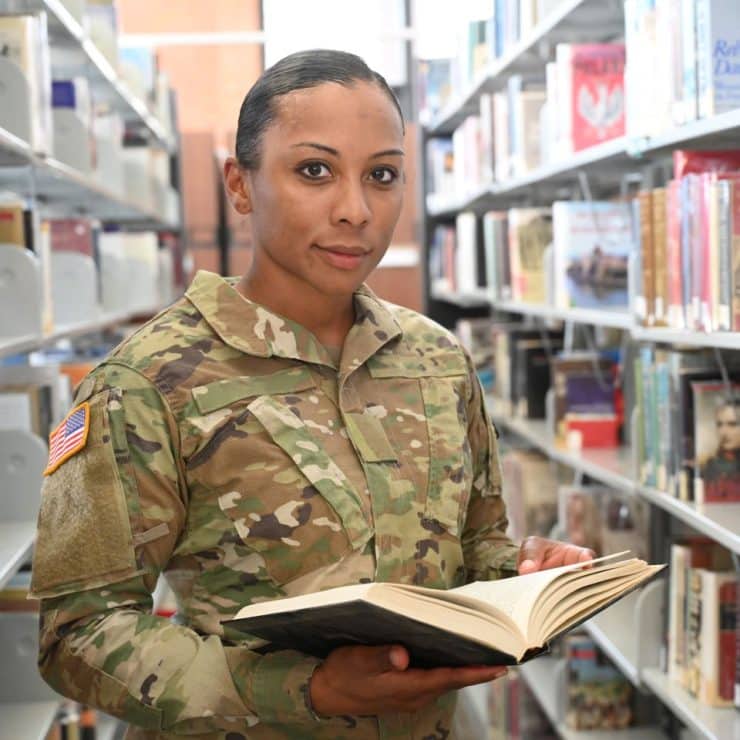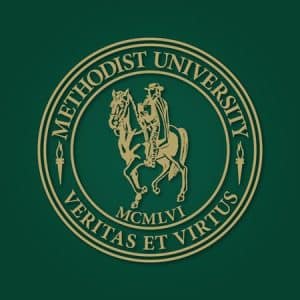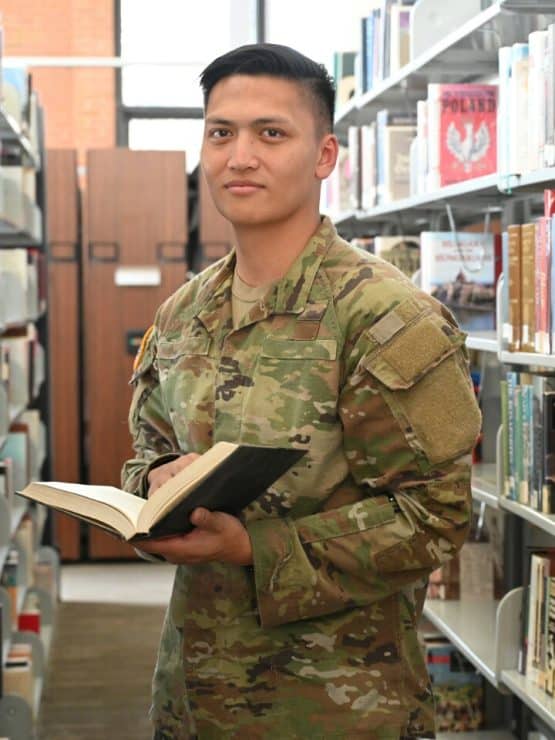
Air Force ROTC
Methodist University has a cross-enrollment agreement with Fayetteville State University, whereby Methodist students can pursue a commission in the United States Air Force. Methodist students can enroll in courses conducted by the Department of Aerospace Studies at Fayetteville State University. The full-time day student is not charged additional tuition for an Air Force Reserve Officer Training Corps (AFROTC) course unless the number of semester hours he/she is taking exceeds eighteen. Then the student must pay the regular academic rate for each semester hour beyond the eighteen-hour full-time load. AFROTC at Detachment 607 is a voluntary educational program designed to provide University students an opportunity to earn an Air Force commission while simultaneously working toward a degree. The AFROTC Mission is to produce leaders for the Air Force and build better citizens for America. Students enroll in Air Force ROTC classes at the same time and in the same manner as they do for their other college courses. Classes are taught on the campus of Fayetteville State University.
Mission
To produce leaders for the Air Force and build better citizens for America.
Enrollment Criteria
The first two years of the Air Force ROTC college program, the General Military Course (GMC), are open to all students who are at least 14 years old. The last two years of the college program is the Professional Officers Course (POC). Scholarship and POC cadets are on contract and must meet the Air Force ROTC and Department of Defense eligibility standards ranging from physical fitness to U.S. citizenship.
Scholarships
Current emphasis in the Air Force ROTC College Scholarship Program is to award scholarships to candidates pursuing undergraduate engineering or other scientific and technical disciplines. Nearly 90 percent of Air Force ROTC scholarships are awarded to students in these disciplines. However, students in every degree program enjoy scholarship opportunities, as the Air Force seeks to engage students who excel both academically and militarily. Scholarships are awarded in increments of four and three. The above criteria may change each academic year. Reference afrotc.com for the latest information.
Institutional Awards for ROTC Students
Students who are awarded full-tuition scholarships through Army ROTC or Air Force ROTC will receive the following awards from Methodist University. These awards will replace any previously awarded institutional scholarship/grant funds.
- Commuting ROTC full-tuition scholarship recipients in the campus-based program will be awarded a $3,000 per year ROTC Academic Scholarship each year of their ROTC Scholarship.
- ROTC full-tuition scholarship recipients who live in on-campus housing will be awarded an ROTC Room/Board Scholarship for each year of their ROTC Scholarship. This scholarship covers the cost of room and board charges each year. The ROTC Room/Board Scholarship will cover the standard double occupancy cost of any residence hall (if available, private room cost is an extra fee) as well as the full cost of any MU meal plan.
Four-Year Program
The first two years of the Air Force ROTC four-year program, the General Military Course (GMC), consists of one hour of classroom work, two hours of physical fitness training, and a two-hour leadership laboratory each week. Upon completion of the General Military Course (GMC) requirements, cadets who wish to compete for entry into the last two years of the program, the Professional Officers Course (POC), must do so under the requirements of the POC selection process (PSP). This system uses qualitative factors, such as grade-point average (GPA), unit commander evaluation, and standardized test scores (e.g., ACT, SAT, and Air Force Officer Qualifying Test) to determine a student’s officer potential.
After selection, students must complete a summer four-week field training encampment at an assigned Air Force base before entering the Professional Officers Course (POC). Cadets enrolled in the POC attend three hours of classroom work, two hours of physical fitness training, and two hours of leadership laboratory each week.
In the POC, cadets apply what they learned in the General Military Course (GMC) and at their field training encampment. Professional Officer Course (POC) cadets conduct the leadership laboratories and lead the unit’s cadet wing. Each AFROTC detachment includes a cadet wing based on the Air Force organizational structure of flight, squadron, group, and wing. POC classes are small. Emphasis is on group discussions and cadet presentations.
Classroom topics include leadership, management, communication skills, and the national defense policy. Once enrolled in the POC, all cadets are enlisted in the Air Force Reserve and assigned to the Obligated Reserve Section. This entitles POC cadets a $500 nontaxable subsistence allowance paid monthly until the student graduates, is commissioned, or is disenrolled. This allowance has a 600-day maximum. GMC cadets on scholarship (contracted) also receive the subsistence allowance. However, GMC contracted cadets do not receive the allowance during the summer.
Note: AFROTC offers the one, two, three and four year programs for both undergraduate and graduate students. Please call or email for more information.
Interested in Methodist University’s Air Force ROTC program?
If you have questions, reach out to the contact info below. If you’re ready to apply today, visit the link below!
Air Force ROTC Courses
ARS 1110, and 1120 HERITAGE AND VALUES OF THE USAF I & II (1)
This survey course is designed to introduce students to the United States Air Force and Air Force Reserve Officer Training Corps. Featured topics include mission and organization of the Air Force, officership and professionalism, military customs and courtesies, Air Force officer opportunities, group leadership programs, and an introduction to communication skills. Leadership laboratory is mandatory for AFROTC cadets and complements this course by providing cadets with followership experiences.
Prerequisite: none
Offered: ARS 1110 fall; ARS 1120 spring
ARS 2110, 2120 TEAM AND LEADERSHIP FUNDAMENTALS I & II (1)
This survey course is designed to facilitate the transition from Air Force ROTC cadet to Air Force ROTC officer candidate. It examines the general aspects of air and space power through a historical perspective. Utilizing this perspective, the course covers a time period from the first balloons and dirigibles to the space-age global positioning systems in the Persian Gulf War. Historical examples are provided to extrapolate the development of Air Force capabilities (competencies), and missions (functions) to demonstrate the evolution of what has become today’s USAF air and space power.
Furthermore, the course examines several fundamental truths associated with war in the third dimension (e.g., Principles of War, Tenets of Air and Space Power). This course provides the cadets with a knowledge level understanding for the general element and employment of air and space power, from an institutional, doctrinal, and historical perspective. In addition, the students will continue to discuss the importance of the Air Force Core Values, through the use of operational examples and historical Air Force leaders and will continue to develop their communication skills. Leadership laboratory is mandatory for AFROTC cadets and complements this course by providing cadets with opportunities for applied leadership experiences discussed in class.
Prerequisite: none
Offered: ARS 2110 fall; ARS 2120 spring
ARS 3110, 3112 LEADING PEOPLE AND EFFECTIVE COMMUNICATION I & II (3)
This course guides the student through a study of leadership, management fundamentals, professional knowledge, Air Force personnel and evaluation systems, ethics, and the communication skills required of an Air Force junior commissioned officer. Case studies are used to examine Air Force leadership and management situations as a means of demonstrating and exercising practical application of the concepts being studied. Leadership Laboratory is mandatory for AFROTC cadets and complements this course by providing cadets with opportunities for applied leadership experiences discussed in class.
Prerequisite: Only contracted AFROTC cadets may enroll in the advanced course.
Offered: ARS 3110 fall; 3120 spring
ARS 4110, 4120 NATIONAL SECURITY AFFAIRS AND COMMISSIONING PREPARATION I & II (3)
This course examines the national security process, regional studies, advanced leadership ethics, and Air Force doctrine. Special topics of interest focus on the military as a profession, officership, military justice, civilian control of the military, preparation for active duty, and current issues affecting military professionalism. Within this structure, continued emphasis is given to refining communication skills. A mandatory Leadership Laboratory complements this course by providing advanced leadership experiences, giving students the opportunity to apply the leadership and management principles of this course.
Prerequisite: Only contracted AFROTC cadets may enroll in the advanced course.
Offered: ARS 4110 fall; ARS 4120 spring
Leadership Laboratory/PT (0)
Leadership Laboratory (LLAB) is a dynamic and integrated grouping of leadership developmental activities designed to meet the needs and expectations of prospective Air Force second lieutenants and complement the AFROTC academic program. It is a student planned, organized, and executed practicum conducted under the supervision of the Detachment Commander and Operations Flight Commander.
Contact
Capt. Joshua Lampman

